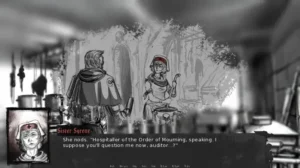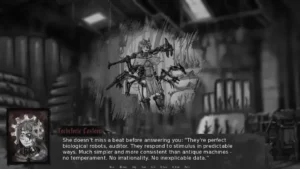
Imperium Bureaucracy Hero
Play Imperium Bureaucracy Hero
Imperium Bureaucracy Hero review
Explore the narrative-driven experience that blends dark humor with strategic decision-making
Imperium Bureaucracy Hero stands out as a uniquely crafted interactive experience that challenges players to navigate the complexities of administrative power within a richly detailed universe. The game combines compelling narrative storytelling with meaningful choices that shape your character’s journey. Whether you’re drawn to the intricate world-building, the morally ambiguous decision-making, or the character-driven interactions, this title offers something distinctly different from mainstream gaming experiences. Players consistently praise the exceptional writing quality and the way the game balances humor with genuine emotional depth, creating an experience that lingers long after the credits roll.
Understanding Imperium Bureaucracy Hero’s Core Gameplay Experience
You sit down at your new desk, a mountain of data-slates teetering precariously on one corner. Your title is “Administratum Adept, Grade VII,” but your reality is that of a glorified paper-pusher in a galaxy-spanning empire where the paperwork is literally eternal. This is your introduction to Imperium Bureaucracy Hero gameplay, and it’s unlike any interactive fiction experience you’ve had before. 🪐
The core loop isn’t about shooting aliens or swinging swords; it’s about managing memos, triaging resource requests, and navigating a byzantine hierarchy where a misplaced stamp can doom an entire planet. It’s a brilliant, satirical twist on a familiar universe, and the Imperium Bureaucracy Hero story unfolds not on a battlefield, but through the forms you stamp, the requests you approve, and the colleagues you either befriend or infuriate. It’s a masterclass in making paperwork feel palpably tense and morally weighty.
What Makes the Narrative Structure So Compelling?
The genius of the Imperium Bureaucracy Hero narrative lies in its pacing and presentation. You aren’t a hero hearing a prophecy; you’re a cog trying to understand the machine. Information is drip-fed to you through fragmented reports, whispered corridor conversations, and heavily redacted documents. You have to piece together the bigger picture, much like a detective. 🕵️♂️
This slow-burn approach means that every new piece of intel feels like a genuine discovery. You might process a routine ammunition requisition for a front-line unit one day, only to find a follow-up casualty report from the same unit the next, forcing you to confront the direct consequences of your “routine” work. The game’s atmosphere is a perfect blend of grimdark futility and laugh-out-loud dark humor. One moment you’re stifling a chuckle at an overly formal memo about a missing crate of sacred ink, and the next, you’re staring at the screen, gut-punched by a simple report detailing the collateral damage of a decision you made three hours ago.
The writing is sharp, witty, and deeply immersive. It doesn’t tell you the bureaucracy is soul-crushing; it makes you feel the crushing weight of a thousand identical forms yourself.
“I’ve played hundreds of narrative games, but none where I felt such genuine anxiety over a shipping manifest. The writing in Imperium Bureaucracy Hero makes you care about the most mundane details, because it constantly reminds you that lives are literally on the line. It’s bureaucratic horror at its finest.”
How Do Your Choices Shape the Story?
If you think your choices in most games are tough, wait until you play this one. Imperium Bureaucracy Hero is built on a foundation of narrative choices and consequences that are deliberately ambiguous. There is rarely a clear “Paragon” or “Renegade” option. Instead, you’re constantly choosing between the lesser of two evils, or the greater of two compromised goods.
The game’s branching story paths are not about finding a “good” or “bad” ending, but about navigating a web of outcomes where every success comes with a cost, and every failure might reveal an unexpected opportunity. Your decisions don’t just change a line of dialogue; they reroute entire supply chains, alter the fates of planetary populations, and reshape your relationships with every character in the department.
Let me give you a concrete example from my first playthrough. I was faced with a classic moral decision making in games scenario, but framed in the most mundane way possible. A Forge World, vital to the war effort, requested an emergency allocation of rare materials to repair its primary power generator. The forms were all in order. However, a separate, low-priority request from a fledgling agri-world caught my eye. They needed those same materials for a new irrigation system to prevent a famine.
The choice was brutal:
* Approve the Forge World request: Secure the continued production of war material, earning you praise from high command and strengthening the sector’s military. The agri-world would likely face starvation and societal collapse.
* Divert resources to the Agri-World: Save millions of civilians from famine, acting on your conscience. However, you risk delaying the war effort, potentially causing greater loss of life at the front lines, and definitely incurring the wrath of the Mechanicus.
I chose the agri-world. I felt like a hero… for about twenty minutes. Then, a report landed on my desk. A regiment on the front, lacking the new tanks my diverted resources would have built, had been overrun. The casualty list was pages long. The game didn’t flash a “You failed!” message. It just presented me with the cold, hard data. My “good” deed had directly, quantifiably, led to that regiment’s destruction. This is the heart of the Imperium Bureaucracy Hero gameplay—your narrative choices and consequences are real, messy, and haunting.
| Your Decision | Immediate Consequence | Long-Term Branching Effect |
|---|---|---|
| Approve the Inquisitor’s data request | Gain a powerful ally in the Inquisition | Your department is placed under greater scrutiny; colleagues become fearful |
| Deny the request, citing procedure | Anger a powerful figure, creating a new enemy | Your department gains a reputation for integrity, opening up new story paths with other factions |
| Falsify the data to protect a colleague | Immediate crisis is averted, colleague is safe | You now have a secret that can be used against you; the Inquisitor may discover the truth later |
Exploring Character Relationships and Interactions
The soul of this interactive fiction experience isn’t just the paperwork; it’s the people you do the paperwork with. The character relationship system is incredibly nuanced. Your coworkers aren’t just quest-givers; they are individuals with their own agendas, fears, and loyalties. They remember everything. 🤝
How you handle your duties directly impacts how they perceive you. Consistently siding with the Ecclesiarchy on resource disputes will earn you a friend in the local confessor but will make the Tech-Priests view you with suspicion. Help a fellow adept cover up a minor mistake, and they might later provide you with a crucial piece of off-the-record intelligence. Betray that trust, and you’ll find your own requests mysteriously “lost” in the system.
This system is dynamic. Relationships aren’t a simple meter that goes from “Disliked” to “Liked.” They are multifaceted. Someone might respect your efficiency while deeply distrusting your motives. Another might like you personally but will not hesitate to report you for a procedural violation if it serves their career. This makes every interaction a delicate dance.
The Imperium Bureaucracy Hero story is, in many ways, the story of the office politics within your department. The grizzled veteran who has seen it all, the ambitious young upstart trying to climb the ladder, the pious scribe who sees heresy in every typo—these characters feel real because their reactions to your narrative choices and consequences are complex and believable. You shape your protagonist not through a skill tree, but through your actions and alliances, defining their personality one stamped document at a time.
Ultimately, the Imperium Bureaucracy Hero gameplay forces you to confront profound themes of power, corruption, and morality. You start as a nobody, but the power you wield through your rubber stamp is immense. The game asks: in a system designed to dehumanize, can you hold onto your humanity? Or will you become just another part of the machine, justifying every terrible decision as “just following procedure”? There are no easy answers, only the endless, crushing, and darkly hilarious tide of paperwork, and your choices within it. 📜⚖️
Imperium Bureaucracy Hero represents a masterclass in interactive storytelling, delivering an experience that prioritizes narrative depth and meaningful player agency. The game’s exceptional writing quality, combined with its willingness to explore morally complex themes without offering easy answers, creates a memorable journey that resonates with players long after completion. From the intricate character relationships to the branching narrative paths that respond authentically to player choices, every element works in concert to create something genuinely special. Whether you’re a seasoned player of narrative-driven games or someone seeking a fresh perspective on interactive fiction, Imperium Bureaucracy Hero offers a compelling reason to invest your time. The community continues to grow around this title, with players sharing their unique experiences and the different paths they’ve discovered through their playthroughs. If you’re looking for a game that challenges your assumptions about morality, power, and human connection, this is absolutely worth experiencing.


















